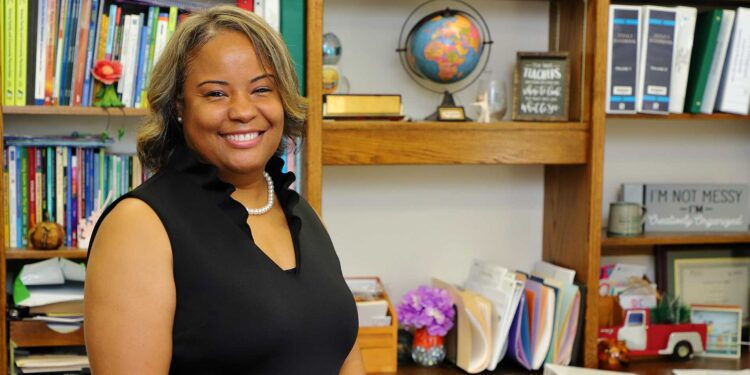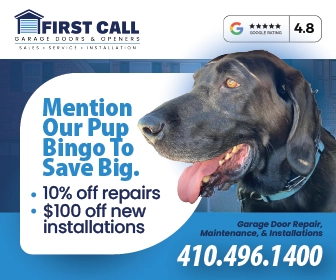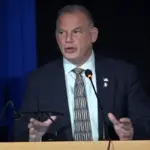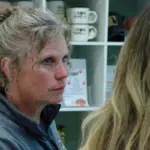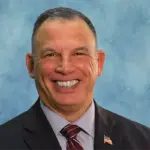Supervisor of Title I, Testing & School Performance, Carroll County Public Schools
compiled by Kym Byrnes, photography by Nikola Tzenov
Prioritizing People and Partnerships
Dr. Kendra Hart had her sights set on becoming an attorney. She wanted to fight for the vulnerable in the criminal justice system. In college, fate would put her on a path to teaching, and while her professional career has been spent in the classroom instead of the courtroom, her commitment to advocating for those in need has not wavered. Dr. Hart is the supervisor of Title I, Testing and School Performance for Carroll County Public Schools (CCPS), and one only need be in her presence for a moment to feel her excitement and passion for the work. Her favorite part of the job is “The kids, The kids, The kids.” And sitting at the top of her bucket list is an intense desire to be on at least one episode of Sesame Street. Married to her high school sweetheart and mom to four grown children, Dr. Hart says that she remembers every day that behind every number, every piece of data, is a name, a person. She fights vehemently to ensure that our youngest learners are getting the foundation they need to be successful in education and ultimately, in life.
When and how did you land in Carroll County?
Originally from Baltimore, we were living in Virginia and I was getting ready to have my fourth child. I needed to be closer to my mom, who lived in Baltimore, and we looked in Carroll County — and here we are about 20 years later. I have one older brother, but my mom is No. 6 of 13 children, so we have a large family. I have four children — my oldest will be 32 this summer and he’s an attorney; my second is 25 and he’s an electrical engineer; my third is 23 and an assistant fashion designer in New York; and my fourth just turned 21 and he’s in college studying biochemistry. I married my high school sweetheart, we both went to Baltimore City College High School, and we still like each other. I think the key is spending quality time together and communication.
At what point did you know you wanted to be an educator?
I was a criminal justice and psychology major in college. I wanted to be a lawyer and focus on criminal justice. The program I was in ended after the deadline to apply for law school and my professor suggested I take an education course to bridge the gap. I volunteered at an elementary school and fell in love with it, and never looked back. The feeling and charge you get from seeing a kid accomplish something — not only do they feel great, you feel good about it because that’s a skill they will own for the rest of their life, and no one can take that away from them. Education is something no one can take away from you and it opens the doors to many opportunities.
You have a lot of letters behind your name — holding a Doctor of Education degree with a concentration on teacher leadership, Master of Science degree in education, Master of Arts in teaching, and a Bachelor of Arts in criminal justice and psychology. Do any of those degrees mean more than others? Why is continuing to achieve your own education so important?
Getting the degree is not important to me, it’s being a role model and showing what the possibilities are that is important — showing what you can do while you’re parenting, while you’re volunteering in the community, while you’re working. Each degree came with great times and challenges. [While earning my] doctorate degree my grandmother took sick and there were times I wanted to stop because life was hard. You have to learn to keep pushing, and I thought about what she’d want me to do. She’d want me to keep pushing. I also never did my schoolwork while my kids were still awake because I didn’t want to take that time from them, so I would do my work at night, and I’m not a night person — that was a real challenge. Those were the challenges: making sure I gave my family what they needed but also making sure I did what I needed to get grades in my program. I wanted to be a role model for my kids to let them know they can do anything.
Your current title is Supervisor of Title I, Testing and School Performance. Can you explain what that job entails?
The Title I piece is for schools with high numbers of families that qualify for free and reduced lunch; those schools are given federal funds to implement programs to give equal opportunity and access to education. I work with the homeless liaison to support families who identify as homeless. We try to reach families early as they transition to pre-K. I get to work with a lot of people who have that same mindset in wanting to reach families early and find resources that match their needs.
The testing part of the job deals with assessments required by the state. We oversee that for all grade levels. We help oversee that part in training, facilitation, making sure students get accommodations, and ensuring the testing windows are appropriate. We get the results and analyze them and share appropriately. School performance relates to state testing so we can measure and see where we are in the state to adjust course to make sure we’re giving students what they need.
Does the state’s Blueprint for Education plan impact the work you oversee — are there any big changes in the work you do?
We have some new schools that might be coming on board as Title I and Carroll County is expanding pre-K so most schools will have full-day pre-K. Blueprint won’t be a big deal for me because for us, it’s just another way to measure how we’re doing. Carroll County speaks for itself: We are always top-performing in the state, and that is because of our teachers out there — we just support them. To me it won’t change much because the excellence in instruction is already taking place, Blueprint is just a measuring piece to give to the state. Carroll has always been in a good place in terms of education — and I can say that personally and professionally.
What do you love about the work you do?
The kids. The kids. The kids. You can walk into a classroom even if you had a bad morning and a kid will just do something, whether it’s academic performance or in response to a question or just interaction with you, and it can change your day. I do have a favorite with the elementary students — the drive of wanting to learn, the innocence. Then in the middle schools you see students working hard and collaborating and making decisions together and problem solving — they are building them up to be productive in society. Then in high school students are exploring what they want to do next — course selection and trying different things. My second-favorite part is collaborating with others. It takes a village, so when you can learn together and give ideas and share professional development, it’s a great learning experience for everyone. COVID reminded me just how much I love collaborating and working with people.
What are some of the challenges in your work?
For me, the hard part is that we have to talk about homeless students and poverty. I wish there were no conversations about that because I wish it didn’t exist. It’s not just numbers for me because behind every number there’s a kid and a family. That’s always been hard for me, and COVID made it worse because most of us had the pleasure of being in our homes. Where were those homeless kids and families — they were out in the midst. I always put myself in their place: What decisions would I want someone to make on my behalf, to communicate to me? Also no matter what interventions you put in place or teaching strategies or teacher caliber, there are always children with learning problems. I wish the world could be about growth standards, but we’re in a mastery standard model. We can’t forget that we have some students and families that need our services beyond what we’re providing to everyone else.
What brings you joy outside of your professional career?
I love interactions — attending events and musicals and being with family and friends. I love anything geared towards church. I serve as president of the board of trustees for the library and I’m a new board member to Carroll Food Sunday. Anytime we can be of service, that’s what brings me joy — when you help people and reach out. When you’re blessed I think it’s a responsibility to give it back. I love to read, and my new thing is diamond dots (a type of crafting). I’m not one to stay tucked away.
What advice do you have for the next generation of educators?
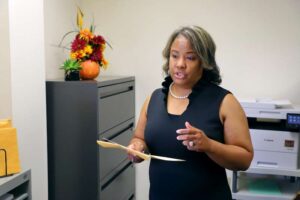
First, enjoy what you do. Take the time to enjoy your students. When we meet with new students at the beginning of the year I say, “I can teach you to teach, but I can’t teach you to like your students.” When you like your students, they like you back, and when they like you, you can get them to do and try anything, whether it’s challenging or easy. Secondly, students go home and tell their families how much they like you or not, and that determines what the family thinks of you. If a kid likes you and you like that kid — and it has to be genuine — then you have collaboration with the family. It takes the entire family to collaborate with you in order for that kid to be successful. Like what you do and like your kids.
I also say we set the tone for the classroom. It doesn’t matter if they are rich or poor — every kid comes with a lot, and sometimes you are the only smile they see that day, the only kindness they see every day, and you are a constant because they come to that school every day.
And be prepared. There are going to be great days and days that are really tough because your kids are going through something and you go through that with them. Surround yourself with the right team, then take advantage of learning opportunities so you can constantly grow your skills because kids constantly need new innovations. If you enjoy what you do, you will have no problem with any of that.
What’s next for you?
A secret about me that only my kids and husband knows is that I want to be on at least one episode of Sesame Street. To me it represents what the world can be — no matter the academic level, there is equal opportunity for kids, respectful communications between all characters. They all smile, and that is contagious and lightens the room. You see genuine care and interest in others, acts of kindness and all forms of diversity embraced. That’s an ideal world. I will also continue to be a servant leader and continue to be a part of the community I live and work in.


